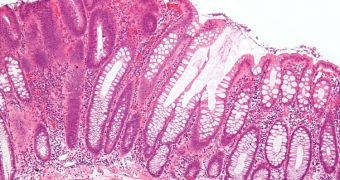About 1 in 10 people who suffer from inflammatory bowel disease (IBD) will go on to develop colon cancer, primarily due a specific type of DNA damage caused by inflammation. Researchers in the United States believe they may have found a way to address this issue.
In a study conducted on lab mice, scientists at the Cambridge-based Massachusetts Institute of Technology (MIT) discovered that rodents whose bodies were unable to repair the DNA damage were very likely to develop colon cancer.
In addition, the group also found three enzymes that apparently play a critical role in repairing this type of damage. They hypothesize that augmenting their functions via drugs could boost DNA repair rates, and that this could work in humans.
Addressing colon cancer is a top priority for medical researchers. In the US, it is the second leading cause of death, and no effective treatments to eradicate the condition exist. Reducing inflammation and boosting DNA repair currently appear to be the most promising directions of research.
The study team was led by professor of biological engineering and biology Leona Samson, who also holds an appointment as a member of the Center for Environmental Health Sciences at the Institute.
She believes that some people may be more prone to developing colon cancer than others (following IBD) because each body produces varied amounts of the three enzymes. Therefore, it could be possible to use these amounts as a prediction tool for determining who is most likely to develop the condition.
“All other things being equal, if the same inflammatory response is present in the colon of different individuals, but they have differences in DNA-repair capability, they’re probably going to respond differently,” Samson explains.
Details of the research appear in a paper published in the June 11 online issue of the esteemed Journal of Clinical Investigation. Research scientist Jennifer Calvo and former MIT scientist Lisiane Meira were the lead authors of the study.
“This study gives insights that will help us to understand the precise mechanisms that cause inflammatory bowel disease-associated colorectal cancer, and will open the door to discovering better targeted chemopreventative agents,” says Steven Lipkin, who was not part of the research team.
The expert holds an appointment as an associate professor of medicine at the Weill Cornell Medical College. He comments that the study does a great job at demonstrating that distinct DNA-repair pathways are involved in repairing DNA damage caused by inflammation in the colon.

 14 DAY TRIAL //
14 DAY TRIAL //